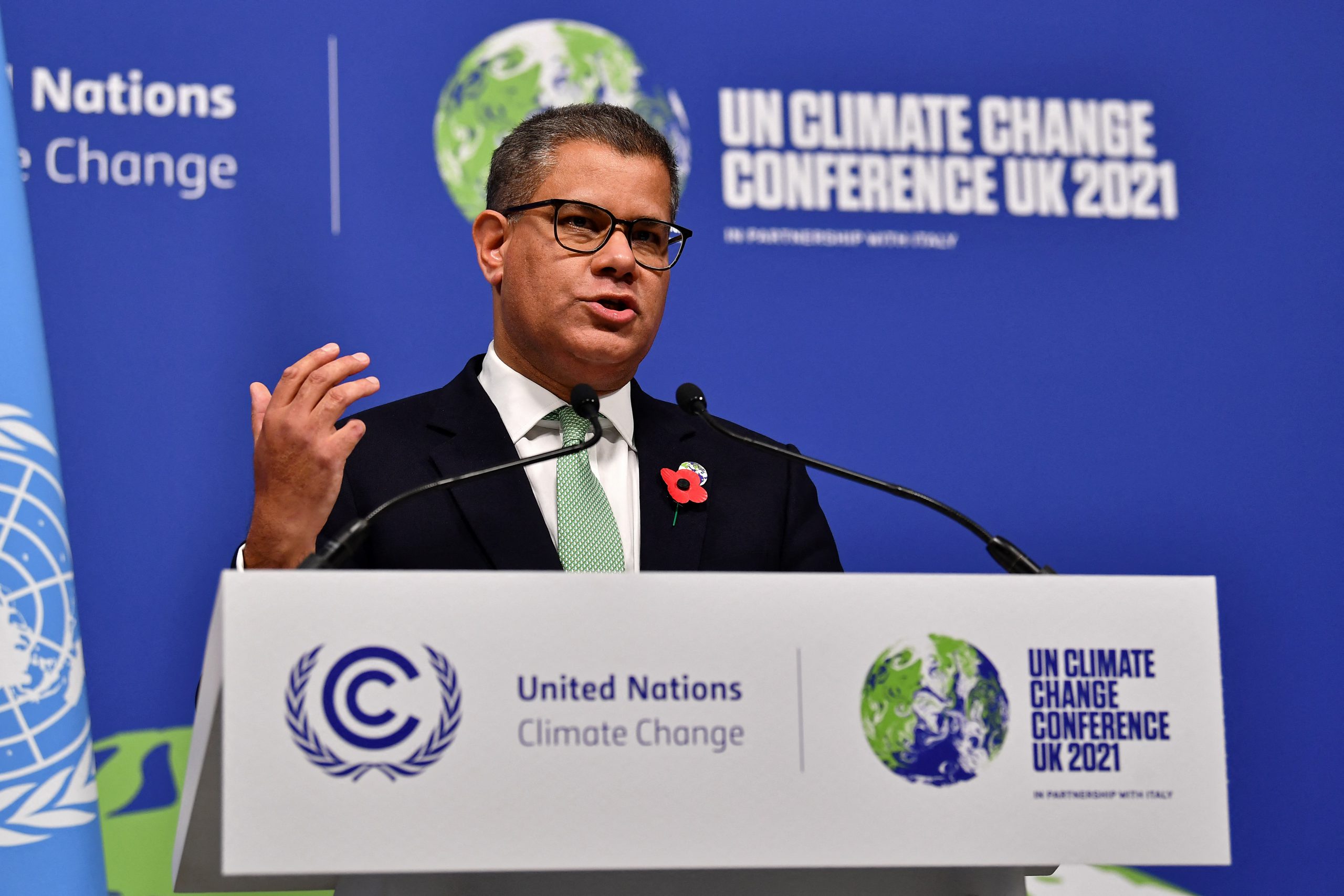
Britain’s President for COP26 Alok Sharma speaks at a press conference at the close of the COP26 UN Climate Change Conference in Glasgow on November 13, 2021. Photo: Ben Stansall/AFP
Why abandoning fossil fuel investments is the optimal catalyst for setting Africa on the right development trajectory
Climate change is perhaps the ultimate ‘wicked problem’. Or, for economists, it’s the ultimate collective action problem, as demonstrated by the recently closed 26th Conference of the Parties (CoP) in Glasgow. Global political will to take measures necessary to avoid decimating the planet for future generations is in short supply. India, for instance, will only commit to net zero by 2070. But the scientific evidence strongly suggests that leaving all remaining fossil fuels in the ground is imperative for limiting warming to manageable levels. One can understand the developing world’s hesitancy, however.
A recent Foreign Affairs article compellingly argued, for instance, that fossil fuel divestment is essentially unfair towards African countries. In a nutshell, the divestment movement stands accused of cutting off a development lifeline. Given the miniscule proportion of greenhouse gas emissions that African countries contribute, divestment is cast as essentially hypocritical and destructive.
This is an argument with which everyone should sympathise. It is all good and well for wealthy countries, whose production and consumption patterns created the environmental destruction, with which we all live, to preach from a posture of comfort and affordability. Global energy and transport revolutions therefore require a just transition if they are to achieve the Paris Agreement targets in a way that avoids pushing African countries deeper into poverty.
Indeed, the very countries driving divestment have profited from oil and gas for decades. However, it is not entirely true that divestment drives consistently fail to consider the vital role some fuels play in powering the growth of developing economies, especially in sub-Saharan Africa. Nigeria, by way of example, is rich in natural resources but still energy poor. It is, therefore, right to argue that the transition to net-zero emissions must not come at the expense of affordable and reliable energy for people, cities and industry. Less right, though, is the idea that continued reliance on fossil fuels will help to aid such a transition, even if the preference is predominantly for natural gas rather than oil per se.
Missing from too many of the ‘just transition’ analyses is an acknowledgement of why countries like Nigeria and Angola remain energy poor despite being oil wealthy. Since oil became commercially viable, both countries failed to translate their prodigious oil wealth into inclusive and sustained development. This reality of the oil curse must be addressed before questions of the role of natural gas in electrification can be addressed with any degree of clarity. Prevailing wisdom has it that unless a country’s institutions are strong at the time of discovering oil wealth, rents will accrue to political and business elites, entrenching a bargain at the heart of de facto ruling coalition that consolidates wealth and power for the few at the expense of the many. The availability of these rents disincentivizes the ruling coalition from building a broad-based economy with multiple tax revenue streams. Politically, this means that the costs of reform (towards better governance) are higher than the costs of maintaining the status quo.
Clean energy, laudably, is central to the Nigerian government’s plan to transition to net zero emissions. Indeed, the goal to electrify five million households through the Solar Naija programme by 2023 is admirable. However, according to the Foreign Affairs article referenced above, “weak traditional grids will continue to hamper wind and solar penetration long into the future”. To overcome this weakness, the author appeals to the speed at which gas-fired power can be ramped up or down to meet demand. He further writes that “our citizens cannot be forced to wait for battery prices to fall or new technologies to be created in order to have reliable energy and live modern, dignified lives.”
There are at least three critical factors to address here. First, solar and wind projects, strategically positioned, need not rely on centralised grid infrastructure. In fact, micro grids should be a major focus for African countries in the years ahead. Precisely because they do not rely on the establishment of expensive transmission grid infrastructure, these systems are ideal for overcoming energy poverty. Centralised grid networks should largely be abandoned in a world that has to do everything it possibly can to wean itself from fossil fuels. Moreover, trying to distribute electricity over vast distances is subject to significant energy (and rent) leakage, rendering the system inefficient. While developing countries have concerns over being locked into expensive IP arrangements entailed in renewable energy projects, innovative arrangements can be found that are less costly than being locked into dirty alternatives.
Second, the argument presupposes that gas is cheap and renewables are prohibitively expensive. However, all recent research points to the sheer speed of simultaneous improvements in quality and decrease in costs of solar grids and batteries. A June 2020 report by UCL, Berkeley, noted that the US could derive 90% of its power without greenhouse gas emissions at lower electricity tariffs. Gas-fired power stations still take a long time to build, and mega-projects of any kind are subject to unproductive rent-seeking. The idea of natural gas as a kind of bridge towards a green economy sounds plausible in theory, but in practice the governance risks are material. By the time a gas-fired power station is built, the costs of renewable energy and battery storage will likely have descended further.
Third, continued investments into fossil fuels – the exploration, production and burning of them – has two destructive economic effects. First, it comes at the opportunity cost of allocating resources towards building local industries that can improve and expand renewables. Foregoing the latter risks leaving African countries even further behind their more industrialised counterparts. Second, it locks countries into destructive path-dependence because mega-projects typically exhibit sunk-cost fallacies. South Africa’s two latest coal-fired power stations, for instance, are still not fully operational and have incurred significant cost and time overruns. They should have been abandoned but the government continued to pour resources into them. At least partially as a result, the state-owned energy parastatal is now indebted to the tune of nearly US$35 billion, which is equivalent to about half the country’s entire annual budget.
African countries have an opportunity to leapfrog traditional industrialisation paths by tapping into global value chains associated with the transition to clean energy. On the grounds of justice, it can well be argued that African countries should not be denied the opportunity to exploit their natural gas reserves. However, there are practical moral barriers to such arguments. Past experience, for instance, strongly suggests that fossil fuels are unlikely to suddenly transform energy poverty into wide-scale electrification. If they were going to serve that purpose, they would already have done so. It is time, therefore, to see the just transition differently.
Justice is ultimately about ensuring that we entrust a better world to our children and grandchildren. The divestment movement provides us with an opportunity to truncate the historical relationship between environmental degradation and income per capita. Even while decrying divestment as a hypocritical injustice, we might do well to embrace the opportunities that it entails. African countries have vast quantities of minerals and metals that the world requires for the global transport and energy revolutions, along with other new technologies. Our focus should be on exploiting those in ways that develop our capabilities to optimally tap into the global value chains associated with new products such as solar panels, electric vehicles, battery power walls, wind turbines and so forth. The longer we lament the unstoppable train that is the divestment movement, the more opportunities we will lose.
Ultimately, the key to solving the wicked climate change problem lies in taking advantage of the opportunities entailed in the development of clean energy technologies. These technologies are no silver bullet, but countries currently stuck in fossil fuel dependency need to be sufficiently incentivised to break that cycle of rent and energy inefficiency. If that is achieved, global collective action might be in greater supply by CoP27.
Dr Ross Harvey is a natural resource economist and policy analyst, and he has been dealing with governance issues in various forms across this sector since 2007. He has a PhD in economics from the University of Cape Town, and his thesis research focused on the political economy of oil and institutional development in Angola and Nigeria. While completing his PhD, Ross worked as a senior researcher on extractive industries and wildlife governance at the South African Institute of International Affairs (SAIIA), and in May 2019 became an independent conservation consultant. Ross’s task at GGA is to establish a non-renewable natural resources project (extractive industries) to ensure that the industry becomes genuinely sustainable and contributes to Africa achieving the Sustainable Development Goals (SDGs). Ross was appointed Director of Research and Programmes at GGA in May 2020.











